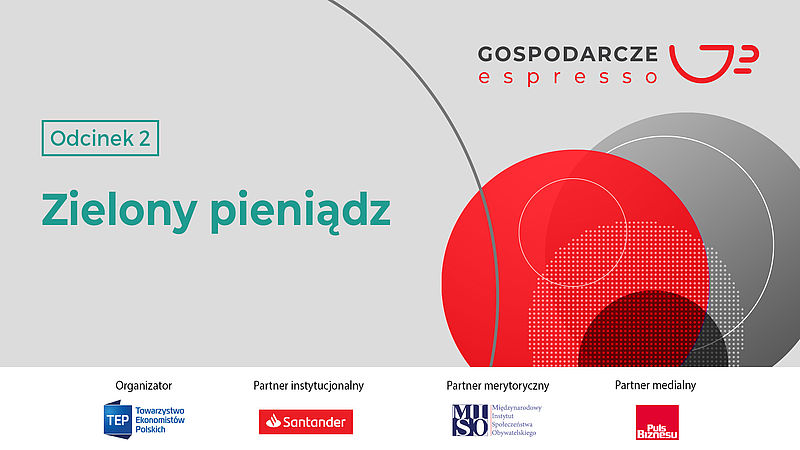Green Money - Economic Espresso
The attended speakers were: Maria Andrzejewska (Director General of UNEP/GRID Center), Krzysztof Pietraszkiewicz (President of the Polish Bank Association), Aleksandra Stanek-Kowalczyk (Managing Director of SAPERE and Assistant Professor at the Warsaw School of Economics), Katarzyna Szwarc (Plenipotentiary of the Minister of Finance for Capital Market Development Strategy) and Maciej Tarnawski (Director of the Credit Markets Department, Santander Bank Poland).
Economic Espresso is a project that provides a platform for a lively, substantive discussion and exchange of experiences and views on the current condition of the Polish economy and key socio-economic developments.
In the second episode, experts analyzed the progress and challenges of greening the Polish economy, the impact of the banking sector on the green transition, the role of entrepreneurs and increased public awareness in this regard.
- Worldwide, about 25% of energy comes already from renewable energy sources. In Poland it's not so good, although the possibility for individuals to install photovoltaics, i.e. just the development of the prosumer market, has caused that at the moment between 6 and 7 gigawatts produced in our country come from renewable energy sources - Maria Andrzejewska said.
- Several analyses of the public space have a common denominator. They point to the astronomical cost of the climate transition by 2050. Whichever figure one accepts, the public sector will not be able to bear it alone. Private sector involvement is necessary, provided that it will not replace a good public policy - Katarzyna Szwarc noted.
- It's been many years since we introduced to the Polish market the first instruments linked to sustainability and ESG (environmental, social and corporate governance area issues - Ed.) performance. What pleases me the most is that we have done this in accordance with standards and requirements of the international market. This is good because it allows for transparency and it relates to the standards operating in international markets - Maciej Tarnawski stressed.
- We must also remember that the issues we are discussing today must be harmonized not only in Poland and Europe, but also across the world. This is how you build credibility and reliability with investors. It should also be noted that we will not start financing only what is “green” overnight. Our economy in transition needs to be managed - and managed in different places, at different levels - Krzysztof Pietraszkiewicz explained.
- I think there is a growing awareness among entrepreneurs of the need for green transformation. Changes need to be made both at the level of business organizations, financial institutions, regulators, and at the level of the consumer, too - Aleksandra Stanek-Kowalczyk said.
Green transformation is an extremely important issue that will impact the fate of the entire planet. Experts participating in the debate agreed that the key to introducing a change is cooperation at all levels - governments, businesses and consumers. Good regulation, raising awareness, education are just a few examples of the steps we need to take to minimize the negative impact we have on the environment.
The discussion was moderated by Łukasz Korycki, deputy editor-in-chief of Puls Biznesu.


